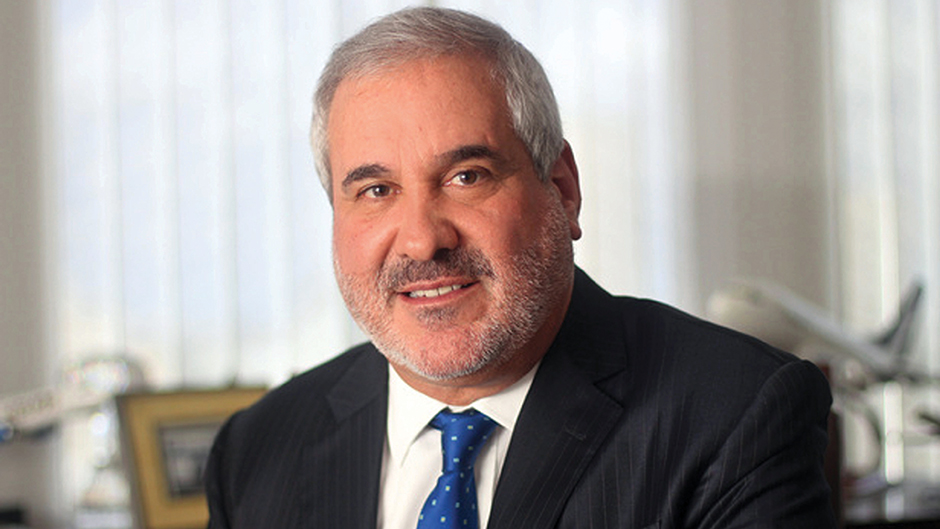Steven Marks' first aviation trial was a disaster.
Marks, J.D. ’85, was fresh out of the University of Miami School of Law and struggling to make a mark working the leftover commercial cases his higher-ups at Podhurst Orseck sent his way. His office was a converted closet he shared with another young associate, the two of them splitting one phone, crammed between stacks of cleaning supplies.
The case, Chason v. Bell, was supposed to be his breakthrough. A helicopter crashed into the Atlantic Ocean off Martin County, killing the pilot, and seriously injuring two passengers. Marks' test-pilot father had taught him to fly by age 12, so Marks felt comfortable with the basic mechanics of an aircraft. He was confident he could pin the blame of the crash on a manufacturing defect.
But in the middle of the trial, Marks was handed a note informing him his grandfather had died. He started crying uncontrollably, rushed out of the courtroom, and the trial was delayed so he could attend the funeral.
After the trial resumed, defense attorneys called a surprise witness. Marks was so enraged he lashed out at the judge, suddenly terrified he’d be held in criminal contempt (he was not). In the end, despite repeated assurances from a bailiff who had seen his share of jury trials, Marks lost.
“I was really devastated,” he said.
Marks took the lessons he learned from that case and quickly turned things around. He took another aviation crash case to trial and won. And then another. And then another.
“I must’ve had 40 victories in a row,” he said.
Ever since, Marks has established one of the biggest aviation litigation portfolios in the nation. He secured an industry-changing “nine-figure” settlement for the families of victims of SilkAir Flight 185, which crashed in Indonesia in 1997. During that trial, he parked the tail section of a Boeing 737 in front of the California courthouse for two months so jurors would see it every day.
Marks worked on Air France Flight 4590, a Concorde that ran over debris on a Paris runway during takeoff and crashed into a hotel in 2000, killing everyone aboard. He handled Metrojet Flight 9268, which was downed by a terrorist bomb minutes after taking off from Egypt in 2015, and Germanwings Flight 9525, which was crashed deliberately into a mountain in the French Alps in 2015. And he’s currently representing nearly 100 victims from two Boeing 737 Max crashes after a judge appointed him as one of three attorneys to lead the plaintiff’s executive committee.
Due to his expertise in complex, multi-party litigation, he was also tapped to serve on the executive committee for the NFL concussion litigation, helping to secure a $1 billion long-term settlement on behalf of thousands of retired players.
Lessons Learned
Marks credits his time at Miami Law with the foundational learning that’s helped him achieve partner status at Podhurst Orseck. During his time at Miami Law, Marks served as the editor-in-chief of the University of Miami Law Review and as a member of the Order of the Coif and the Society of Bar and Gavel. He has remained an active member of the UM community, serving on the Law Alumni Association board of directors and the Law School Dean’s Advisory Council.
His mother, a world-renowned artist, went to the University of Miami. His daughter is now going to UM. That’s why Marks views the university community as family.
“The university has been very, very good to me,” he said. “It gave me a career, gave me an opportunity to get a law degree, it gave me the good fortune to be editor (of the Law Review). Great years at UM.”
Marks ascribes his professional success to various factors, including a decision he made early on to ignore the common practice of trying aviation cases in federal court, opting for state courts instead. Too often, federal aviation cases became MDLs or consolidated federal actions. These procedures expand the number of plaintiffs (and attorneys) involved and dilute any one attorney’s ability to steer the legal strategy of each case.
“It’s litigation by committee and I just didn’t like it,” he said.
The Common Denominator: Victims
But Marks says his most valuable skill may be his ability to connect with grieving families. When airplanes crash, it has become common practice for the victims’ families to band together and interview different teams of lawyers. Marks isn’t ashamed to say that his emotional investment in each case helps him gain the trust of those victims.
“I do cry,” he said. “I cry in front of jurors. It’s real, it’s not an act.”
In some cases, the emotions overwhelm him. While visiting a woman in Orlando who lost her husband in an airplane crash, her 2- and 5-year-old daughters ran up to Marks screaming, “Are you getting daddy? Are you bringing daddy home?”
Two of Marks' four children were the same age at the time, and the thought of his children going through a similar ordeal tormented him so much that he stopped flying airplanes recreationally for several years.
“When you’re at trial for two to three months and stirring up all this emotion and meeting with widows every night, it’s tough to keep a center,” he said.
In some cases, however, the victims’ families have become lifelong friends.
“You forge these friendships and relationships that are just so rewarding,” he said. “Somehow, we struggled through it, and we value life, and you come to peace with the fact that there’s a tragedy and you’re doing good and helping people.
“You’re always on the right side because you’re on the victim’s side.”

